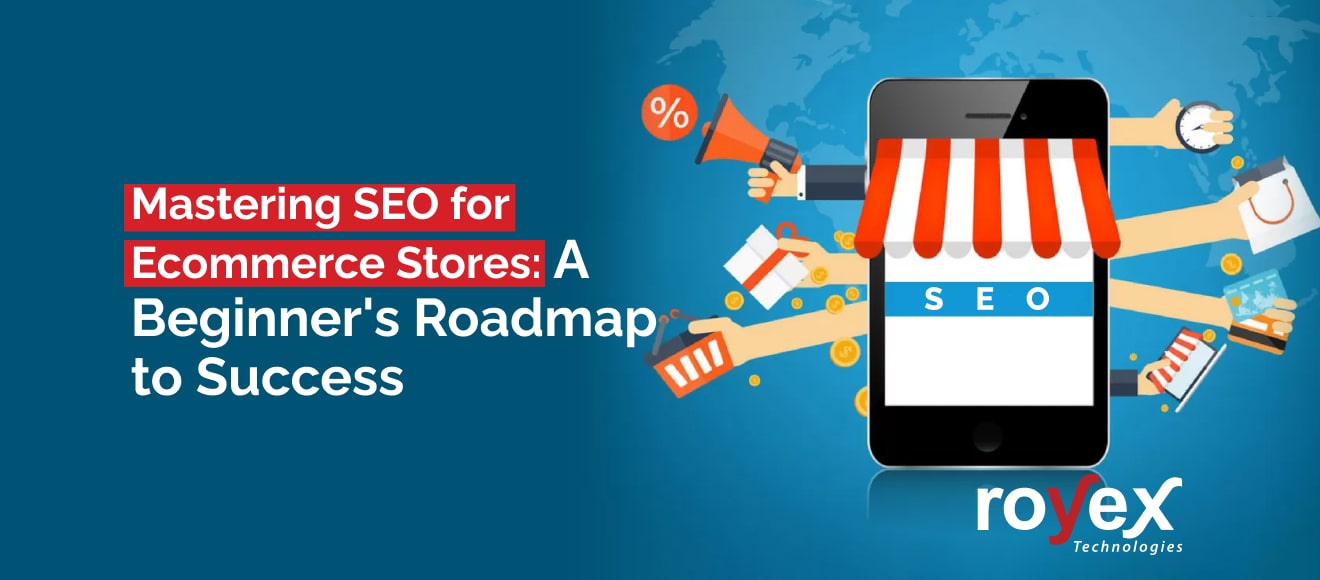
Mastering SEO for Ecommerce Stores: A Beginner's Roadmap to Success
Are you struggling to get your e-commerce store noticed in the crowded online marketplace? Are you curious about how top online stores consistently rank high on search engine results pages? What are the key SEO strategies that can elevate your e-commerce business from obscurity to visibility? Do terms like "keyword optimization" and "backlinks" leave you puzzled and unsure where to start? If these questions resonate with you, you're in the right place.
In today's digital age, the success of an e-commerce business relies on its online visibility and ability to attract relevant traffic, and ec-ommerce businesses cannot afford to overlook the power of search engine optimization (SEO). With an increasing number of consumers turning to online shopping, optimizing your ec-ommerce store for search engines has become an important strategy for driving traffic, boosting sales, and gaining a competitive edge. This article will guide you through the essential steps to master SEO for your e-commerce store, paving the way for long-term success.
The Importance of SEO for Ecommerce Stores

SEO is the practice of optimizing your website to rank higher on search engine results pages (SERPs). For e-commerce stores, this means optimizing product pages, category pages, and other content to attract more visitors from search engines like Google.
According to a study by Forrester Research, 92% of online experiences begin with a search engine query. This statistic underscores the importance of having a strong SEO strategy for your e-commerce store. By optimizing your website for search engines, you increase your visibility in organic search results, making it easier for potential customers to discover your products or services.
Furthermore, a study by BrightEdge found that 53.3% of all website traffic comes from organic search. This organic traffic is highly valuable, as visitors who find your e-commerce store through organic search are often more engaged and more likely to convert into paying customers.
Why SEO Matters for Ecommerce
-
Increased Visibility: 75% of users never scroll past the first page of search results, so ranking higher can dramatically increase your visibility.
-
Cost-Effective Marketing: SEO is one of the most cost-effective marketing strategies. Unlike paid advertising, organic search traffic doesn’t require continuous investment.
-
Improved User Experience: Good SEO practices enhance the usability and functionality of your site, leading to a better user experience.
Key Components of Ecommerce SEO
Here are the key components of effective e-commerce SEO:

Step 1: Keyword Research and Targeting
Keywords are the terms and phrases that users type into search engines. The foundation of any successful SEO strategy lies in effective keyword research and targeting. Start by identifying the keywords and phrases your target audience is using to search for products or services related to your e-commerce store. Tools like Google Keyword Planner, Ahrefs, and SEMrush can provide valuable insights into search volume, competition, and related keywords.
Once you have a list of relevant keywords, prioritize them based on search volume, competition, and relevance to your business. Incorporate these keywords strategically throughout your e-commerce store, including product pages, category pages, and blog content. Effective keyword research is foundational to your SEO strategy. Here’s how to do it:
-
Brainstorm Seed Keywords: Start with basic words related to your products. For example, if you sell shoes, start with terms like "running shoes" or "leather boots."
-
Use Keyword Tools: Tools like Google Keyword Planner, Ahrefs, and SEMrush can help you find relevant keywords with high search volume and low competition.
-
Long-Tail Keywords: Focus on long-tail keywords, which are more specific and less competitive. For example, "best running shoes for flat feet."
Step 2: On-Page Optimization
On-page optimization is the process of optimizing individual web pages to rank higher in search engine results. Here are some key elements to focus on:
-
Title Tags: These are the first things users see in search results. Craft compelling and keyword-rich title tags that accurately describe the content of each page.
-
Meta Descriptions: Write concise and engaging meta descriptions that provoke users to click through to your website.
-
Product Descriptions: Optimize product descriptions with targeted keywords while maintaining a natural, readable flow. Avoid duplicate content, which can hurt your rankings.
-
URL Structure: Use clean, descriptive URLs. For example, "www.yourstore.com/running-shoes" is better than "www.yourstore.com/product123."
-
Header Tags (H1, H2, H3): Use header tags (H1, H2, H3, etc.) to structure your content and incorporate relevant keywords. The H1 tag should contain the primary keyword.
-
Image Optimization: Optimize images by using descriptive file names, alt text, and appropriate image sizes to improve page load times.
Step 3: Technical SEO
Technical SEO ensures that your website meets the technical requirements of search engines for crawling and indexing. Important aspects include:
-
Site Structure and Navigation: Implement a logical site structure and user-friendly navigation to help search engines and users easily navigate your e-commerce store.
-
Site Speed: A fast-loading site improves user experience and rankings. Aim for a loading time under 3 seconds. Optimize your site's loading speed by compressing images, minifying code, and leveraging browser caching.
-
Mobile-Friendliness: Ensure your site is responsive and performs well on mobile devices. Google uses mobile-first indexing, meaning it predominantly uses the mobile version of the content for indexing and ranking.
-
URL Structure: Use descriptive and keyword-rich URLs that are easy for search engines and users to understand.
-
XML Sitemap: Create and submit an XML sitemap to help search engines discover and crawl all the pages on your e-commerce store.
-
Robots.txt File: Use this file to manage which pages search engines should and shouldn’t crawl.
Step 4: Content Marketing
When you develop high-value, informative, and attractive content, you attract more natural traffic. You also set up a reputation in your sector and build credibility with prospective clients.
Think about adding a blog section to your online store where you post articles, guides, and howto explanations tied to your products or industry. Also use other types of content including videos, infographics, and podcasts to serve differing viewer choices.. Effective strategies include:
-
Blog Posts: Write informative blog posts related to your products. For example, if you sell kitchen appliances, you could write about "10 Essential Kitchen Gadgets for Home Chefs."
-
Buying Guides: Create detailed buying guides to help customers make informed decisions.
-
User-Generated Content: Encourage customers to leave reviews and ratings. Positive reviews build trust and can improve your rankings.
Step 5: Link Building
Link building is the process of acquiring high-quality backlinks from reputable websites. These backlinks serve as "votes of confidence" for your ecommerce store, signaling to search engines that your website is a valuable and authoritative resource.
Engage in outreach campaigns, guest blogging, and collaborations with industry influencers and reputable blogs to build natural backlinks. Additionally, leverage local citations and directory listings to improve your local SEO efforts. Strategies include:
-
Guest Blogging: Write guest posts for relevant websites in your niche.
-
Influencer Collaborations: Partner with influencers who can link to your store.
-
Content Sharing: Create shareable content like infographics or industry reports.
Step 6: Local SEO
If you have a physical store or serve a specific geographic area, local SEO is crucial. Key tactics include:
-
Google My Business: Create and optimize your Google My Business listing.
-
Local Citations: Ensure your business information is consistent across local directories.
-
Local Keywords: Use keywords that include your location, such as "buy shoes in New York."
Measuring and Analyzing Your SEO Efforts
Continuous monitoring and analysis are essential for refining your SEO strategy and identifying areas for improvement. Use tools such as Google Analytics and Google Search, along with other SEO tracking platforms. These will help measure your website's activity, discover opportunities to improve rankings, and assess the outcome of your SEO work.
Make sure you consistently check the traffic sources of your website, how well keywords rank, bounce rates and conversion rates. This information will help you make choices based on data and fine-tune your SEO approach according to it. Key metrics to track include:
-
Organic Traffic: Use Google Analytics to monitor the number of visitors coming from organic search.
-
Keyword Rankings: Track your rankings for target keywords using tools like SEMrush or Ahrefs.
-
Conversion Rate: Measure the percentage of visitors who make a purchase.
-
Bounce Rate: Monitor the percentage of visitors who leave your site after viewing only one page.
Facts and Statistics to Consider
- Organic search drives 53% of all website traffic, making it the most significant source of web traffic .
-
61% of marketers say improving SEO and growing their organic presence is their top inbound marketing priority .
-
88% of consumers trust online reviews as much as personal recommendations, highlighting the importance of user-generated content .
-
The first five organic results account for 67.6% of all clicks , emphasizing the need to rank on the first page.
Conclusion
Improving SEO for online stores requires constant study and change. This involves paying attention to keyword research, optimizing each page, working on the technical aspects of SEO, marketing content, building links and focusing on local SEO. This way you boost your store's prominence and draw in more unpaid traffic. It's key that you track your efforts and tweak your plans using the results data. If you're committed and use the right strategy, SEO can be a significant asset for your online business success.
Royex Technologies, a leading Digital Marketing and SEO Agency based in Dubai, is dedicated to enhancing your business and elevating your marketing proficiency to unprecedented heights. We employ a comprehensive approach to amplify your digital presence, ensuring your brand resonates across the digital landscape. With a track record of delivering tangible results, our expertise consistently drives traffic to your website.
Check our portfolio to see our previous works. Contact us via email at info@royex.net or call us at +971566027916. To get started with us.





